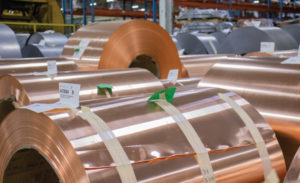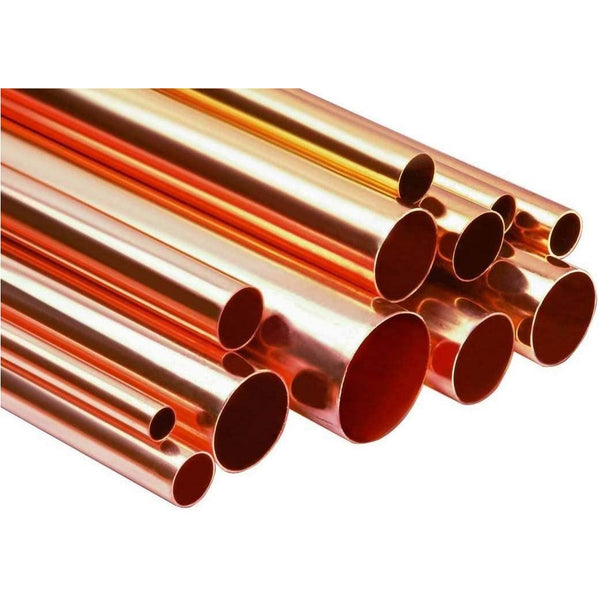Discovering the Diverse Applications of Copper Products in Modern Industries
From enhancing the performance of electrical systems to playing an essential duty in sustainable power innovations, the adaptability of copper is evident. As sectors progressively focus on advancement and sustainability, the varied applications of copper require a closer evaluation, particularly regarding their prospective impact on future ecological techniques and technical developments.
Electric Applications of Copper
Copper is an important product in the electric market, representing approximately 60% of the total demand for non-ferrous metals internationally - Copper Products. Its superior electric conductivity, which is virtually two times that of aluminum, makes it the preferred selection for a wide variety of electric applications. From circuitry systems in business and residential structures to high-voltage power transmission lines, copper makes certain performance and dependability in electricity distribution
Along with electrical wiring, copper is essential to the production of electric components such as generators, transformers, and electric motors. These components utilize copper's thermal conductivity and pliability, necessary for heat dissipation and efficient performance. Copper's resistance to rust boosts the life expectancy and resilience of electric systems, making it an economical solution in the lengthy term.
The growth of renewable resource sources, such as solar and wind power, has actually better increased the demand for copper in electric applications. As sectors change towards sustainable energy services, copper's role becomes even much more essential. Generally, the convenience and efficiency characteristics of copper solidify its status as a cornerstone material within the electrical sector, driving innovation and efficiency across different applications.
Plumbing and Piping Solutions
In contemporary plumbing systems, the choice of materials considerably impacts both functionality and longevity. Copper has actually arised as a recommended alternative because of its special properties, consisting of deterioration resistance and antimicrobial attributes. These characteristics make certain that copper piping stays safe and sturdy for moving safe and clean water, an important consideration in residential and business applications.
One of the crucial advantages of copper in plumbing is its capability to hold up against high temperature levels and pressures, making it suitable for a selection of applications, from hot water systems to heating and cooling networks. Additionally, copper's versatility enables less complicated installation in complex piping layouts, reducing the threat of failings and leaks.
One more noteworthy benefit is copper's lengthy life expectancy, frequently going beyond 50 years with appropriate upkeep. This longevity not only decreases replacement costs however likewise adds to sustainable techniques by lowering waste. Copper's recyclability aligns with modern-day environmental requirements, advertising a round economic situation within the pipes industry.
Copper in Renewable Power
The adaptability of copper expands past pipes applications, playing a crucial role in the renewable energy industry. Its outstanding electrical and thermal conductivity makes it an important material in the production and circulation of eco-friendly power sources, particularly solar and wind power. In solar panels, copper is utilized in photovoltaic cells and electrical wiring, facilitating efficient energy conversion and transmission. Its resistance to corrosion makes certain lasting efficiency, which is important for making the most of energy output over time.

Moreover, as the worldwide need for electric lorries (EVs) rises, copper's duty in battery systems and billing framework ends up being a lot more significant. The material's ability to conduct electrical power successfully is essential to the performance of EV batteries, improving range and charging rate.
Copper's Duty in Electronics
Electronics manufacturing depends heavily on copper's phenomenal homes, specifically its high electric conductivity and thermal effectiveness. These qualities make copper an optimal choice for a large array of digital elements, including connectors, motherboard, and electrical wiring. The steel's capability to efficiently send electrical signals makes certain minimal energy loss, which is vital in high-performance electronic tools.
Moreover, copper's thermal conductivity plays a considerable duty in warmth dissipation, securing sensitive elements from overheating. This is especially crucial in modern electronic devices, where small styles cause raised warmth generation. Copper is likewise preferred for its reference malleability and ductility, permitting it to be easily shaped right into complex designs that satisfy the needs of advanced electronic applications.
With the surge of consumer electronic devices, telecoms, and electrical lorries, the need for copper in the electronics market proceeds to expand. Thus, copper continues to be a keystone product in the ever-expanding area of electronic devices.
Cutting-edge Makes Use Of in Manufacturing

One noteworthy application remains in additive production, where copper-based materials are utilized in 3D printing processes. This permits the creation of intricate geometries and lightweight parts, specifically in the aerospace and automobile fields. Furthermore, copper's thermal conductivity makes it a perfect selection for heat exchangers, enhancing effectiveness in commercial air conditioning systems.
Furthermore, the surge of smart production has seen the incorporation of copper in IoT tools, where its conductive abilities sustain sophisticated noticing technologies. In the realm of sustainable energy, copper is essential in the production of solar panels and wind generators, promoting much more effective power conversion and distribution.
As industries strive for sustainability and technology, copper's flexibility and efficiency remain to place it as an important material, driving innovations in production and adding to the growth of smarter, more efficient products.
Verdict
In recap, copper items show exceptional adaptability throughout numerous modern-day industries. Copper Products. Their exceptional conductivity improves electric applications, while corrosion resistance guarantees integrity in plumbing. The important role of copper in renewable resource and its crucial function in electronic devices emphasize its significance ahead of time lasting practices. Additionally, innovative uses in producing highlight copper's flexibility and enduring significance. Collectively, these applications highlight copper's essential contribution to technological progress and industrial performance in modern society.
From improving the performance of electrical systems to playing a critical duty in eco-friendly power technologies, the adaptability of copper is apparent. As markets significantly focus on technology and sustainability, the diverse applications of copper call for a closer assessment, specifically regarding their prospective influence on future technical improvements and environmental methods.
The development of sustainable power sources, such as solar and wind power, has actually additionally enhanced the need for copper in electrical applications. On the whole, the versatility and efficiency features of visit homepage copper solidify its status as a keystone material within the electrical industry, driving technology and effectiveness across numerous applications.
The convenience of copper extends website link past pipes applications, playing an important duty in the renewable energy field.
Comments on “Why Copper Products Are Crucial for Electric Applications and Effective Electrical Wiring”